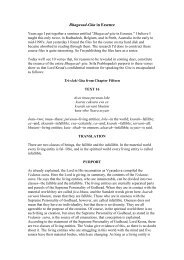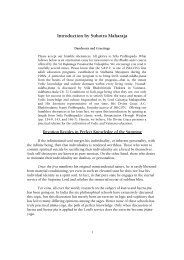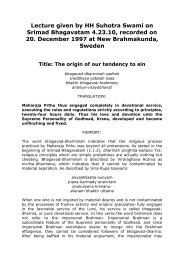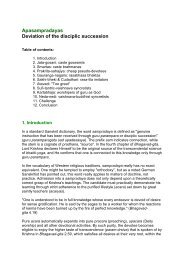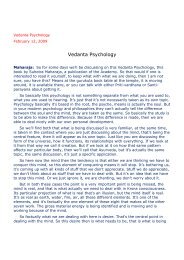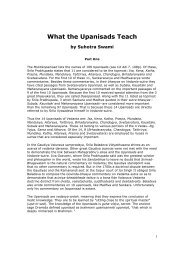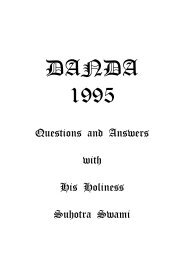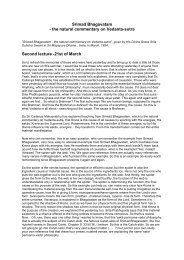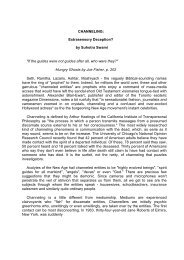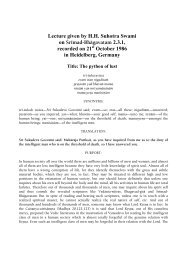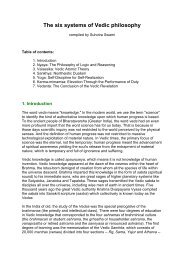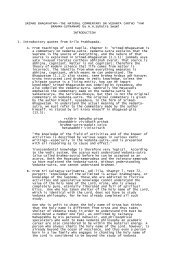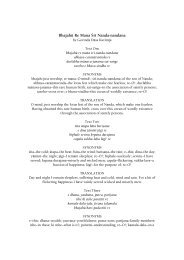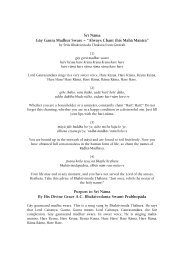Deviant Vaisnava Sects - Suhotra Maharaja Archives
Deviant Vaisnava Sects - Suhotra Maharaja Archives
Deviant Vaisnava Sects - Suhotra Maharaja Archives
You also want an ePaper? Increase the reach of your titles
YUMPU automatically turns print PDFs into web optimized ePapers that Google loves.
of the Nityananda Vamsa sometimes say that Lord Nityananda's divine essence is carried<br />
in their family blood line.<br />
This is mendacious on two counts. First, the ancestors of the Nityananda Vamsa were<br />
actually disciples, not sons, of Lord Nityananda's only and childless son, Sri Virabhadra<br />
Gosvami. Second, a person is known to be a <strong>Vaisnava</strong> not by birth from a particular<br />
womb but by his character.<br />
Up until the early part of this century, the Nityananda Vamsa held the lower-caste<br />
<strong>Vaisnava</strong>s in a thrall of superstition and wrong teachings.<br />
But beginning in the late 1800's, Srila Bhaktivinoda Thakura challenged them in his<br />
popular Bengali-language books like Jaiva Dharma and Hari Nama Cintamani. He<br />
proclaimed that it is not enough to accept a spiritual master merely on the basis of caste.<br />
Before taking initiation, the candidate must be sure that the initiator is fully conversant<br />
with the scriptures and can lift his disciples out of ignorance. The guru should be of<br />
spotless character: if he is addicted to sinful acts, then even those he may have already<br />
initiated must reject him.<br />
Bhaktivinoda's books unleashed a wave of reform in Bengal that pushed the jatagosani<br />
into a defensive stance. But the confrontation came to open war when his son,<br />
Srila Bhaktisiddhanta Sarasvati, took over the Gaudiya mission.<br />
Srila Bhaktisiddhanta Sarasvati publicly smashed the arguments placed before him by<br />
those who held that devotional service was a monopoly of their own caste. Such ideas, he<br />
said, were products of "skin disease."<br />
The basic misunderstanding in materialistic life is that the body is the self. Under<br />
illusion, one thinks of oneself as American, British, or Indian, young or old, man or<br />
woman, white or black. In fact, however, these are merely bodily designations, labels for<br />
the skin. And so too are designations of family and caste. To take birth in a high family<br />
may offer one an opportunity to become Krsna conscious. But the birth itself is not an<br />
automatic guarantee. Nor does birth in a low family exclude one. Anyone who performs<br />
pure devotional service to the Lord, regardless of jati, or birth, becomes a member of the<br />
transcendental family of Lord Sri Krsna. This is Lord Caitanya's teaching.<br />
Smarta-brahmanas<br />
The Padma Purana, a text of Vedic teachings, states that if we always remember<br />
Visnu or Krsna (smartavyah satatam visnoh) before performing our duty, we<br />
automatically fulfill all scriptural rules and regulations. If we forget Him, we unavoidably<br />
transgress the spirit of the scriptures even if we observe them to the letter, because<br />
keeping Krsna always in mind is the purpose of all the scriptural codes of behavior.<br />
Not everyone admits that purpose. There are three classes of brahmanas: the dvija,<br />
the vipra, and the <strong>Vaisnava</strong>. The third-class dvija is ritualistically initiated, the second-



